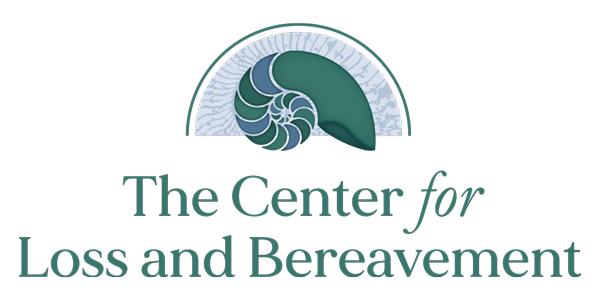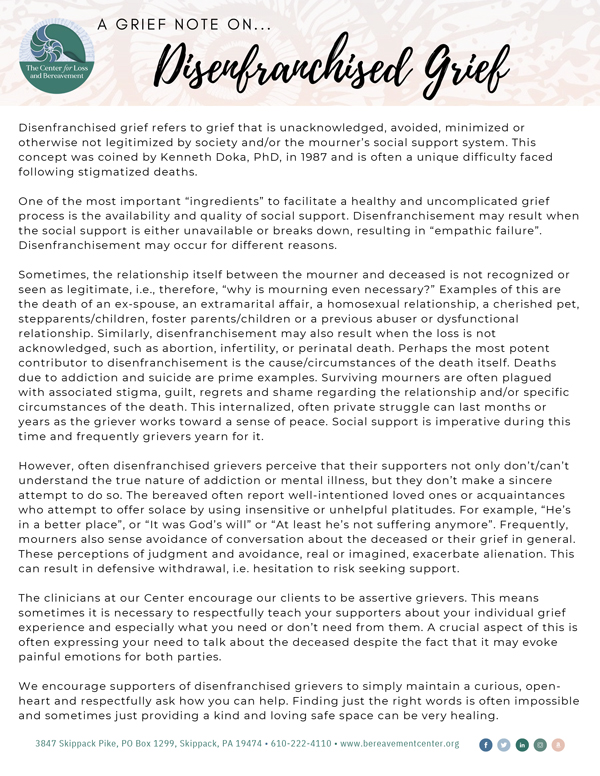CLB Grief Notes
A Grief Note On…
Disenfranchised Grief
Disenfranchised grief refers to grief that is unacknowledged, avoided, minimized or otherwise not legitimized by society and/or the mourner’s social support system. This concept was coined by Kenneth Doka, PhD, in 1987 and is often a unique difficulty faced following stigmatized deaths.
One of the most important “ingredients” to facilitate a healthy and uncomplicated grief process is the availability and quality of social support. Disenfranchisement may result when the social support is either unavailable or breaks down, resulting in “empathic failure”. Disenfranchisement may occur for different reasons.
Sometimes, the relationship itself between the mourner and deceased is not recognized or seen as legitimate, i.e., therefore, “why is mourning even necessary?” Examples of this are the death of an ex-spouse, an extramarital affair, a homosexual relationship, a cherished pet, stepparents/children, foster parents/children or a previous abuser or dysfunctional relationship. Similarly, disenfranchisement may also result when the loss is not acknowledged, such as abortion, infertility, or perinatal death. Perhaps the most potent contributor to disenfranchisement is the cause/circumstances of the death itself. Deaths due to addiction and suicide are prime examples. Surviving mourners are often plagued with associated stigma, guilt, regrets and shame regarding the relationship and/or specific circumstances of the death. This internalized, often private struggle can last months or years as the griever works toward a sense of peace. Social support is imperative during this time and frequently grievers yearn for it.
However, often disenfranchised grievers perceive that their supporters not only don’t/can’t understand the true nature of addiction or mental illness, but they don’t make a sincere attempt to do so. The bereaved often report well-intentioned loved ones or acquaintances who attempt to offer solace by using insensitive or unhelpful platitudes. For example, “He’s in a better place”, or “It was God’s will” or “At least he’s not suffering anymore”. Frequently, mourners also sense avoidance of conversation about the deceased or their grief in general. These perceptions of judgment and avoidance, real or imagined, exacerbate alienation. This can result in defensive withdrawal, i.e. hesitation to risk seeking support.
The clinicians at our Center encourage our clients to be assertive grievers. This means sometimes it is necessary to respectfully teach your supporters about your individual grief experience and especially what you need or don’t need from them. A crucial aspect of this is often expressing your need to talk about the deceased despite the fact that it may evoke painful emotions for both parties.
We encourage supporters of disenfranchised grievers to simply maintain a curious, open heart and respectfully ask how you can help. Finding just the right words is often impossible and sometimes just providing a kind and loving safe space can be very healing.
Join Our
Mailing List
Donate
Today
Request
Information

Affiliations
• NACG
• CBEM Changemaker
• ADEC
• Charity Navigator
Quick Links
About Us
Individual & Family Grief Counseling
Volunteer
News
Grief Support Resources
Contact
Ph: 610-222-4110
Fax: 610-222-4116
3847 Skippack Pike
P.O. Box 1299
Skippack, PA 19474
Support The Center For
Loss and Bereavement
